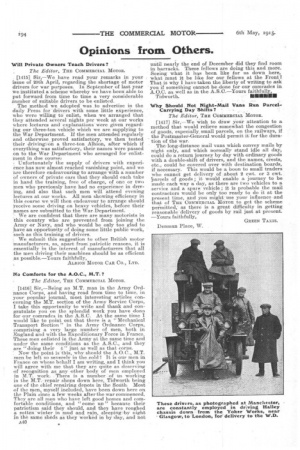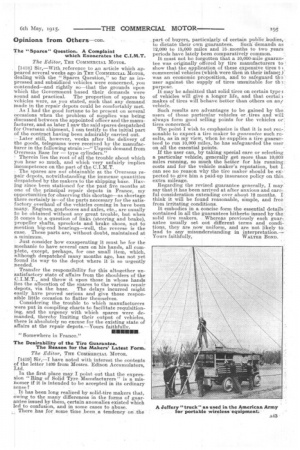Opinions from Others.
Page 14

Page 15

If you've noticed an error in this article please click here to report it so we can fix it.
Will Private Owners Teach Drivers ?
The Editor, THE COMMERCIAL MOTOR.
[1415] Sir,—We have read your remarks in your issue of 20th April, regarding the shortage of motor drivers for war purposes. In September of last year we instituted a scheme. whereby we have beeii able to put forward from time to time a very considerable number of suitable drivers to be enlisted.
The method we adopted was to advertise in the daily Press for drivers with some little experience, who were willing to enlist, when we arranged that they attended several nights per week at our works where lectures and explanations-were given regarding our three-ton vehicle which we are supplying to the War Department. If the men attended regularly and otherwise proved satisfactory, we then tested their drivingeOn a three-ton Albion, after which if everything was satisfactory, their names were passed an to the War Department who arranged for enlistment in due course: Unfortunately the supply of drivers with experience has now almost reached vanishing point, and we are therefore endeavouring to arrange with a number Of owners of private cars that they should each take in hand the training, free of charge, of one or two Men who previously have had no experience in driving, and also that such men will attend evening lectures at our works. All men showing efficiency in This course we will then endeavour to arrange should receive some driving on heavy vehicles, before their 'names are submitted to the War-Department.
:• We are confident that there are many motorists in :this country who are prevented from joining the Army or Navy, and who would be only too glad to have an opportunity of doing some little publie work, such as this training of drivers. We submit this suggestion to other British motor manufacturers, as, apart from patriotic reasons, it is essentially in the interest of manufacturers that all the men driving their machines should be as efficient as possible—Yours faithfully, ALBION MOTOR CAR CO., LTD.
No Comforts for the A.O.C., M.T.?
The Editor, THE COTrIMERCIAL MOTOR.
[1416] Sir,---Being an M.T. man in the Army Ordnance Corps, and having read from time to time, in your popular journal, most interesting artieles conearning the M.T. section of the Army Service Corps, I take this opportunity to write and thank and congratulate you on the, splendid work you have done for our comrades in the A.S.C. At the same time I would like to point out that there is a " Mechanical -Transport Section" in the Army Ordnance Corps, comprising a very large number of men, both in England and with the Expeditionary Force in France. These men enlisted in the Arniy at the same time and under the same conditions as the A.S.C., and they
are "doing their just as well as that corps.
• Now the point is this, why should the A.0.0., M.T. :men be left so severely in the eoId? It is our men in France on whose behalf I am writing, and I think you will agree with me that they are quite as deserving of recognition as any other body of men employed in M.T. work. : There is a number of us working in the M.T.repair shops down here, Tidworth being one of the chief repairing depots in the South. Most of the men, myself included, have been down here on the Plain since a few weeks after the war commenced. They are all men who have left good homes and comfortable conditions, and "come up" because their patriotism said they should, and they have roughed a rotten winter in mud and rain, sleepiby night in The same Sheds as they worked in by day, and not
A40 until nearly the end of December did they find room in barracks. These fellows are doing this and more. Seeing what it has been. like for us down here, what must it be like for our fellows at the Front That is why I have taken the liberty of writing to ask you if something cannot be done for our oomrades in A.O.C. as well as in the A.S.C.—Yours faithfully, Tidworth. 11111111111111.
Why Should, Not Night-Mail Vans Run ParcelCarrying Day'Shifts?
The Editor, THE COMMERCIAL MOTOR.
[1417] Sir,---We wish to draw your attention to a method that would relieve somewhat the congestion of goods, especially. small parcels, on the railways, if the Postmaster-General would permit it for the duration of the war.
The long-distance mail vans which convey mails by night only, and which normally stand idle all day, could do a return journey by day with ordinary goods with a double-shift of drivers, and the names, crests, etc., could be covered over with destination boards, if necessary. This would be a boon to small traders who cannot get delivery of about 2 cwt. or 3 cwt. iaarcels of goods ; it would enable a journey to be made each way a day, as there are two vehicles to a service and a spare vehicle ; it is probable the mail contractors would be only too ready to do it at the present time, and you might use your influence and that of THE COMMERCIAL MOTOR to get the scheme permitted; as there is a great difficulty in getting reasonable-delivery of goods by rail just at present. —Yours faithfully,
GREEN TAXIS. Denman Place, W. The "Spares" Question. A Complaint which Exonerates the C.I.M.T.
The Editor, THE COMMERCIAL M.OTOR.
[1418] Sir,—With reference to an article which appeared several weeks ago in THE COMMERCIAL MOTOR, dealing with the "Spares Question," so far as im pressed and subsidized vehicles were concerned, you contended—and rightly so—that the grounds upon which the Government based their demands were
sound and practical. The proportion of spares to vehicles were, as you stated, such that any demand
made in the repair depots could be comfortably met. As I had the good fortune to be present on several occasions when the problem of supplies was being discussed between the appointed officer and the manufacturer, and as later I saw the said spares despatched for Overseas shipment, I can testify to the initial part of the contract having been admirably carried out. – Later still, however, weeks after the delivery of the goods, telegrams were received by the manufacturer in the following strain :—" Urgent demand from Overseas Base for — type cylinders." Therein lies the root of all the trouble about which you hear so much, and which very unfairly implies incompetence on the part of the C.I.M.T.
The spares are not obtainable at the Overseas repair depots, notwithstanding the immense quantities despatched by the makers to the shipping base. Having since been stationed for the past five months at one of the principal repair depots in France, my opportunities for observing this shortage—as shortage there certainly is—of the parts necessary for the satisfactory overhaul of the vehicles coming in have been many. Engines, gearboxes and axles, etc., are usually to be obtained without any great trouble, but when it comes to a question of links (steering and brake), propeller shafts, sprockets and brake shoes, not to mention big-end bearings—well, the reverse is the ease. These parts are, without doubt, maintained at a minimum.
Just consider how exasperating it must be for the mechanic to have several cars on his hands, all complete, except, perhaps, for one small item, which, although despatched many months ago, has not yet found its way to the depot where it is so urgently needed.
Transfer the responsibility for this altogether unsatisfactory state of affairs from the shoulders of the C.I.M.T., and throw it upon those in whose hands lies the allocation of the spares to the various repair depots, via the base. The delays incurred might easily have proved serious and give those responsible little occasion to flatter themselves.
Considering the trouble to which manufacturers were put in compiling charts to facilitate requisitioning, and the urgency with which spares were demanded, thereby limiting their output of vehicles, there is absolutely no excuse for the existing state of affairs at the repair depots.—Yours faithfully, • "Somewhere in France."
The Desirability of the Tire Guarantee.
The Reason for the Makers' Latest Form.
• The Editor, THE COMMEROIAL MOTOR.
r1419] have noted with interest the contents of the letter 1409 from Messrs. Edison Accumulators, Ltd.
In the first place may I point out that the expression "Ring of Solid Tyre Manufacturers" is a misnomer if it is intended to be accepted in its ordinary sense ?
It has been long realized by solid-tire makers that, owing to the many differences in the forms of guarantee issued by them, certain anomalies existed which led to confusion, and in some cases to abuse.
There has for some time been .a tendency on the part of buyers, particularly of certain public .bodies, to dictate their own guarantees. Such demands as 12,000 to 15,000 miles and 18-months to two years periods have lately been comparatively common. It must not be forgotten that a 10,000-mile guarantee was originally offered by tire manufacturers to show that the application of these expensive tires t.) .commercial vehicles (which were then in their infana.1.). was an economic proposition, and to safeguard the user against the supply of tires unsuitable for till' purpose.
It may be admitted that solid tires on certain type of vehicles will give a longer life, and that certai makes of tires will behave better than others on any vehicle.
Such results are advantages to be gained by the users of those particular vehicles or .tires and willalways form good selling points for the vehicles or: tires concerned.
The point I wish to emphasize is that it is not reasonable to expect a tire maker to guarantee such results, as in my view, when he supplies a tire guaranteed to run 10,000 miles, he has safeguarded the user on all the essential points.
If the user can, by taking special care or selecting a particular vehicle, generally get more than 10,000 miles running, so much the better for his running: costs and for the vehicle maker's reputation, but Ican see no reason why the tire maker should be ex:pected to give him a paid-up insurance policy on this. extra mileage,
Regarding the revised guarantee generally, I may. say that it has been arrived at after anxious and care:, ful consideration extending over about 12 months. I. think it will be found reasonable, simple, and free from irritating conditions.
It embodies in a concise form the essential details contained in all the guarantees hitherto issued by the solid tire makers. Whereas previously each guar.._ antee usually set out different terms and condi-. tions, they are now uniform, and are not likely te lead to any misunderstanding in interpretation.--; Yours faithfully, WALTER BOND.






















